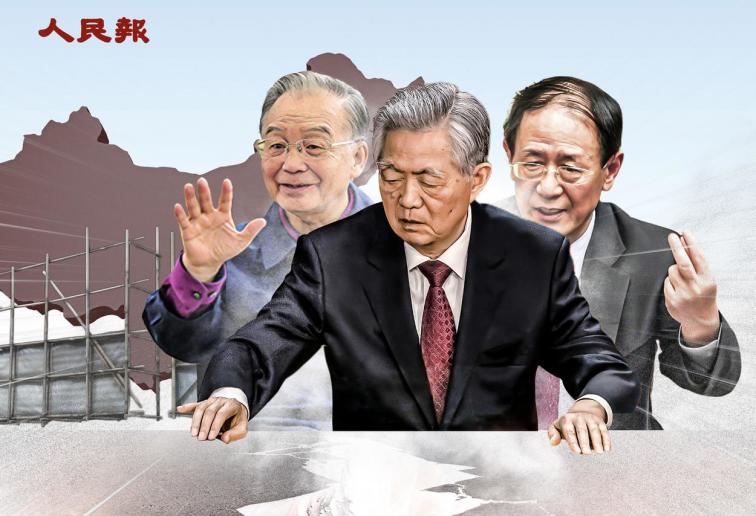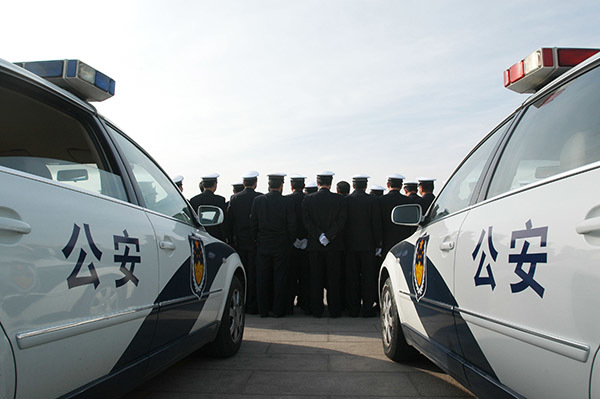Image caption: On October 18, 2021, construction at Evergrande’s Wuhan Cultural Tourism City site in Hubei Province, China, had come to a halt. (Photo by Getty Images)
[People News] On July 8, the Chinese Communist Party officially announced that Zhou Xianwang, a former member of the Party Leadership Group and vice chairman of the Hubei Provincial Political Consultative Conference, is under investigation. Zhou served as mayor of Wuhan from 2018 to 2021. Previously, Jiang Chaoliang, the Party Secretary of Hubei Province at the time, had also fallen from grace. Both were among the officials who concealed the outbreak of COVID-19 in Wuhan in its early stages.
The Circumstances Surrounding Zhou Xianwang’s Investigation
According to the website of the Central Commission for Discipline Inspection (CCDI) on July 8, Zhou Xianwang is suspected of serious violations of discipline and law and is currently undergoing disciplinary review and supervisory investigation by the CCDI and the National Supervisory Commission. Zhou’s case brings the total number of centrally managed officials investigated this year to 34.
Public records show Zhou was born in November 1962 in Jianshi County, Hubei Province, and spent his career in Hubei. In 2017, he became Vice Governor and a member of the Party Leadership Group of Hubei. In 2018, he was appointed Deputy Party Secretary and Mayor of Wuhan. In January 2021, he was transferred to serve as a member of the Party Leadership Group and Vice Chairman of the Hubei Provincial Political Consultative Conference.
In January 2023, during the leadership reshuffle of the Provincial Political Consultative Conference, Zhou no longer held the vice chairman position, until the recent announcement of his investigation.
Multiple sources told reporters from the Economic Observer that Zhou was taken away for investigation by disciplinary authorities on July 4, 2025. Simultaneously, several of his family members were also taken away, and his residence was searched.
On July 6, reporters from the Economic Observer tried multiple times to reach Zhou by phone, but his device was already turned off. According to individuals close to him, Zhou, who rarely initiated contact on WeChat, had sent a classical poem to friends just a few days before being taken away.
The poem he sent was by Southern Song dynasty poet Dai Fugu, and is aptly fitting for the current heatwave in mainland China:
"Scorching Heat"
When will the blazing sun pass?
No breeze can be found.
Bitterly I resent the steaming stove,
Who knows my handkerchief is soaked in sweat?
Zhou’s Investigation Tied to Jiang Chaoliang
Sources said that Zhou’s investigation is related to the case of Jiang Chaoliang.
Jiang, born in August 1957 in Miluo, Yueyang, Hunan Province, served as Party Secretary of Hubei from October 2016 to March 2020. During his tenure, Zhou was promoted from Party Secretary of Huangshi to Vice Governor of Hubei, and later to Mayor of Wuhan.
On February 21, 2025, the CCDI and National Supervisory Commission announced that Jiang Chaoliang was under investigation for serious violations of discipline and law.
Why was Jiang investigated? It still comes down to the pandemic.
When COVID-19 first broke out in Wuhan in early 2020, the local government was widely criticized for its slow response.
AFP reported that in a media interview in January 2020, Zhou Xianwang admitted that he was unable to disclose information about the outbreak and added, "As a local government, I must obtain authorization before I can disclose information." Many observers interpreted this statement as an indirect criticism of the central government.
The Wall Street Journal noted in 2020 that two senior officials in Hubei—Jiang Chaoliang and Ma Guoqiang—were removed and held accountable for the poor response to the pandemic. This reflected Beijing's dissatisfaction with how local officials handled the crisis. However, the article emphasized the symbolic nature of the accountability more than holding them personally responsible for the entire outbreak.
Still, some analysts believe these officials were scapegoats for the global impact of the pandemic.
Officials Treated Like “Straw Dogs”
According to disclosures from the CCDI and National Supervisory Commission, since the 18th Party Congress, about 4.7 million Party members and officials have been investigated, including roughly 207,000 top-level cadres. Since the 20th Party Congress, the number of investigated officials has reached new highs, with millions disciplined each year. In 2024 alone, 58 high-level central officials were investigated, and 889,000 individuals were punished.
When officials are treated like straw dogs, it signals a period of ruthless political infighting. History has seen similar times: under Qin Er Shi (the second emperor of the Qin dynasty), during Stalin’s Great Purge in the Soviet Union, and in China during the Cultural Revolution. All these moments reflect an environment in which the top leader deeply mistrusts those around him and where power is extremely unstable. △
(Originally published by People News)










News magazine bootstrap themes!
I like this themes, fast loading and look profesional
Thank you Carlos!
You're welcome!
Please support me with give positive rating!
Yes Sure!